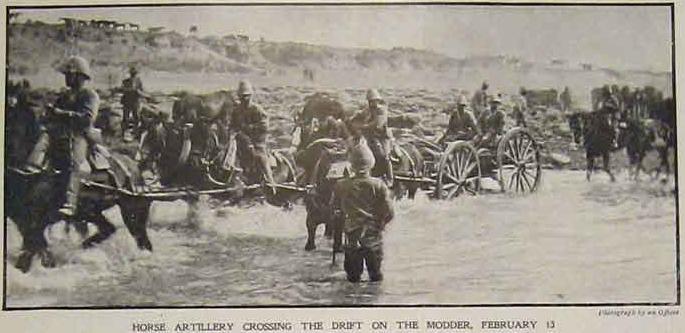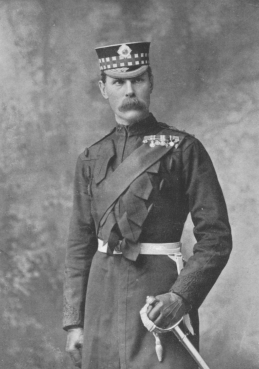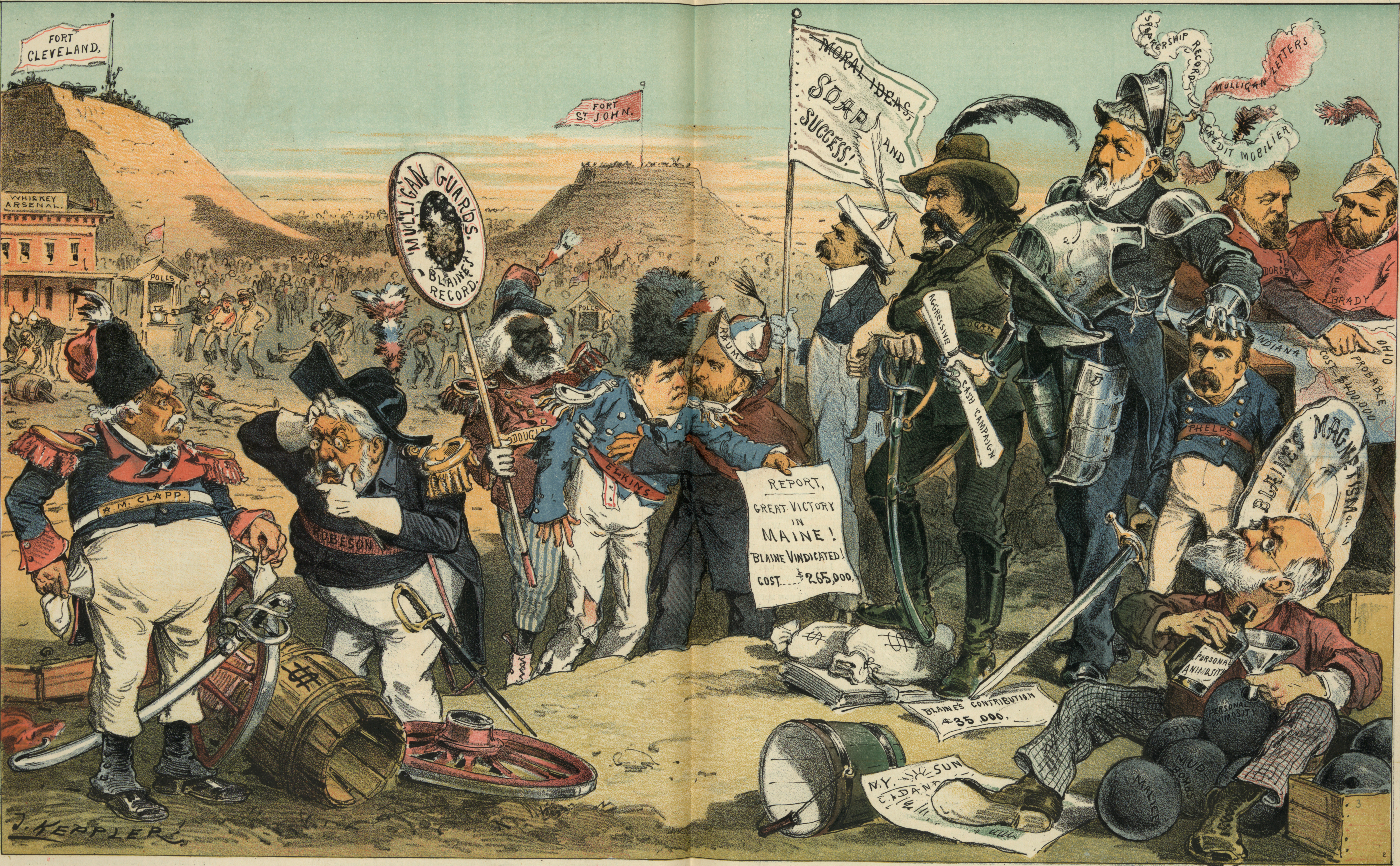|
Piet Cronjé
Pieter Arnoldus "Piet" Cronjé (4 October 1836 – 4 February 1911) was a South African Boer general during the Anglo-Boer Wars of 1880–1881 and 1899–1902. Biography Born in the Cape Colony but raised in the South African Republic, Cronjé had a distinctive appearance, being short with a black beard and was reputed to have considerable personal courage. He made his reputation in the First Boer War, besieging the British garrison at Potchefstroom. He was unable to force their surrender until after the conclusion of the general armistice, and was at this time accused of withholding knowledge of this armistice from the garrison. Cronjé was in command of the force that rounded up Leander Jameson at Doornkop at the conclusion of the Jameson Raid on 2 January 1896. During the Second Boer War, Cronjé was general commanding in the western theatre of war. He began the sieges of Kimberley and Mafeking. At Mafeking, with a force between 2,000 and 6,000 he laid siege ... [...More Info...] [...Related Items...] OR: [Wikipedia] [Google] [Baidu] |
Saint Helena
Saint Helena () is a British overseas territory located in the South Atlantic Ocean. It is a remote volcanic tropical island west of the coast of south-western Africa, and east of Rio de Janeiro in South America. It is one of three constituent parts of the British Overseas Territory of Saint Helena, Ascension and Tristan da Cunha. Saint Helena measures about and has a population of 4,439 per the 2021 census. It was named after Helena, mother of Constantine I. It is one of the most remote islands in the world and was uninhabited when discovered by the Portuguese enroute to the Indian subcontinent in 1502. For about four centuries the island was an important stopover for ships from Europe to Asia and back, while sailing around the African continent, until the opening of the Suez canal. St Helena is the United Kingdom's second-oldest overseas territory after Bermuda. Saint Helena is known for being the site of Napoleon's second exile, following his final defeat in ... [...More Info...] [...Related Items...] OR: [Wikipedia] [Google] [Baidu] |
Kimberley, South Africa
Kimberley is the capital and largest city of the Northern Cape province of South Africa. It is located approximately 110 km east of the confluence of the Vaal and Orange Rivers. The city has considerable historical significance due to its diamond mining past and the siege during the Second Anglo-Boer war. British businessmen Cecil Rhodes and Barney Barnato made their fortunes in Kimberley, and Rhodes established the De Beers diamond company in the early days of the mining town. On 2 September 1882, Kimberley was the first city in the Southern Hemisphere and the second in the world after Philadelphia, Pennsylvania in the United States to integrate electric street lights into its infrastructure. The first stock exchange in Africa was built in Kimberley, as early as 1881. History Discovery of diamonds In 1866, Erasmus Jacobs found a small brilliant pebble on the banks of the Orange River, on the farm ''De Kalk'' leased from local Griquas, near Hopetown, which was his f ... [...More Info...] [...Related Items...] OR: [Wikipedia] [Google] [Baidu] |
Orange Free State
The Orange Free State ( nl, Oranje Vrijstaat; af, Oranje-Vrystaat;) was an independent Boer sovereign republic under British suzerainty in Southern Africa during the second half of the 19th century, which ceased to exist after it was defeated and surrendered to the British Empire at the end of the Second Boer War in 1902. It is one of the three historical precursors to the present-day Free State province. Extending between the Orange and Vaal rivers, its borders were determined by the United Kingdom of Great Britain and Ireland in 1848 when the region was proclaimed as the Orange River Sovereignty, with a British Resident based in Bloemfontein. Bloemfontein and the southern parts of the Sovereignty had previously been settled by Griqua and by ''Trekboere'' from the Cape Colony. The '' Voortrekker'' Republic of Natalia, founded in 1837, administered the northern part of the territory through a '' landdrost'' based at Winburg. This northern area was later in federation ... [...More Info...] [...Related Items...] OR: [Wikipedia] [Google] [Baidu] |
Eyre Crabbe
Brigadier General Eyre Macdonnell Stewart Crabbe, CB (15 March 1852 – 8 March 1905) was a Grenadier Guards officer who fought in the Sudan campaign to rescue General Gordon and in the Second Boer War. Background and early life His father was Colonel Eyre John Crabbe of the 74th Regiment, himself the son of Colonel Joseph Crabbe of the East India Company's army. His mother, Elmina Stewart, came from a Jamaica planter family. After education at Harrow School he joined the Grenadier Guards as a lieutenant on 18 October 1871 and was one of the first ensigns not to have to pay for a commission, following the Cardwell reforms. During service in Ireland as a young lieutenant, he married in 1876 Emily Constance Jameson, a descendant of John Jameson, the founder of the Dublin distilling family. Military career Crabbe worked for several years as a musketry instructor, but in 1882 he helped organise the logistical operations for the British attack on Alexandria. He was promoted t ... [...More Info...] [...Related Items...] OR: [Wikipedia] [Google] [Baidu] |
Grenadier Guards
"Shamed be whoever thinks ill of it." , colors = , colors_label = , march = Slow: " Scipio" , mascot = , equipment = , equipment_label = , battles = OudenardeWaterlooAlma Inkerman SevastopolOmdurman Ypres Battle of the Bulge Cyprus Emergency , anniversaries = , decorations = , battle_honours = , battle_honours_label = , disbanded = , flying_hours = , website = , commander1 = The King , commander1_label = Colonel-in-Chief , commander2 = The Queen Consort , commander2_label = Colonel of the Regiment , commander3 = , commander3_label = , commander4 = , commander4_label ... [...More Info...] [...Related Items...] OR: [Wikipedia] [Google] [Baidu] |
Frederick Roberts, 1st Earl Roberts
Field Marshal Frederick Sleigh Roberts, 1st Earl Roberts, (30 September 1832 – 14 November 1914) was a British Victorian era general who became one of the most successful British military commanders of his time. Born in India to an Anglo-Irish family, Roberts joined the East India Company Army and served as a young officer in the Indian Rebellion during which he was awarded the Victoria Cross for gallantry. He was then transferred to the British Army and fought in the Expedition to Abyssinia and the Second Anglo-Afghan War, in which his exploits earned him widespread fame. Roberts would go on to serve as the Commander-in-Chief, India before leading British Forces for a year during the Second Boer War. He also became the last Commander-in-Chief of the Forces before the post was abolished in 1904. A man of small stature, Roberts was affectionately known to his troops and the wider British public as "Bobs" and revered as one of Britain's leading military figures at a time w ... [...More Info...] [...Related Items...] OR: [Wikipedia] [Google] [Baidu] |
Battle Of Paardeberg
The Battle of Paardeberg or Perdeberg ("Horse Mountain") was a major battle during the Second Anglo-Boer War. It was fought near ''Paardeberg Drift'' on the banks of the Modder River in the Orange Free State near Kimberley. Lord Methuen advanced up the railway line in November 1899 with the objective of relieving the Siege of Kimberley (and the town of Mafeking, also under siege). Battles were fought on this front at Graspan, Belmont, Modder River before the advance was halted for two months after the British defeat at the Battle of Magersfontein. In February 1900, Field Marshal Lord Roberts assumed personal command of a significantly reinforced British offensive. The army of Boer General Piet Cronjé was retreating from its entrenched position at Magersfontein towards Bloemfontein after its lines of communication were cut by Major General John French, whose cavalry had recently outflanked the Boer position to relieve Kimberley. Cronjé's slow-moving column was intercep ... [...More Info...] [...Related Items...] OR: [Wikipedia] [Google] [Baidu] |
Battle Of Magersfontein
The Battle of MagersfonteinSpelt incorrectly in various English texts as "Majersfontein", "Maaghersfontein" and "Maagersfontein". ( ) was fought on 11 December 1899, at Magersfontein, near Kimberley, South Africa, on the borders of the Cape Colony and the independent republic of the Orange Free State. British forces under Lieutenant General Lord Methuen were advancing north along the railway line from the Cape to relieve the siege of Kimberley, but their path was blocked at Magersfontein by a Boer force that was entrenched in the surrounding hills. The British had already fought a series of battles with the Boers, most recently at Modder River, where the advance was temporarily halted. Lord Methuen failed to perform adequate reconnaissance in preparation for the impending battle and was unaware that Boer ''Vecht-generaal'' (Combat General) De la Rey had entrenched his forces at the foot of the hills, rather than the forward slopes, as was the accepted practice. That allowed t ... [...More Info...] [...Related Items...] OR: [Wikipedia] [Google] [Baidu] |
Martinus Theunis Steyn
Martinus (or Marthinus) Theunis Steyn (; 2 October 1857 – 28 November 1916) was a South African lawyer, politician, and statesman. He was the sixth and last president of the independent republic the Orange Free State from 1896 to 1902. Early life The Steyn family lived near Winburg on the farm Josephinesdal. Steyn was born on 2 October 1857 on the farm Rietfontein near Winburg in the Orange Free State. His father Marthinus (known as Marthinus 'blinkstewels') was away from home, following the death of his own father, to assist his mother on a three-month-long round trip from Winburg to Swellendam in the Cape Colony. As Steyn's mother, Cecilia, was pregnant with Marthinus Theunis, they thought it safer for her to stay with her sister Gertruida, who was married to Theunis Wessels, a farmer at Rietfontein. Steyn was intended to be named only Marthinus after his father, but because of the care that Theunis and Gertruida took during Cecilia's pregnancy, Steyn was named both after ... [...More Info...] [...Related Items...] OR: [Wikipedia] [Google] [Baidu] |
Koos De La Rey
Jacobus Herculaas de la Rey (22 October 1847 – 15 September 1914), better known as Koos de la Rey, was a South African military officer who served as a Boer general during the Second Boer War. also had a political career and was one of the leading advocates of Boer independence. Early life Born on Doornfontein Farm in the Winburg District of the Orange Free State, Koos was the son of Adrianus Johannes Gijsbertus de la Rey and Adriana Wilhelmina van Rooyen. was a Boer of French Huguenot, Spanish and Dutch descent. His grandfather, a school teacher and the patriarch of the family in South Africa, came from Utrecht, Netherlands. After the Battle of Boomplaats, the family farm was confiscated by the British and the family trekked into the Transvaal and settled in Lichtenburg. As a child received very little formal education. The De la Rey family moved, this time to Kimberley after the discovery of diamonds. As a young man, de la Rey worked as a transport rider on the route ... [...More Info...] [...Related Items...] OR: [Wikipedia] [Google] [Baidu] |
Pyrrhic Victory
A Pyrrhic victory ( ) is a victory that inflicts such a devastating toll on the victor that it is tantamount to defeat. Such a victory negates any true sense of achievement or damages long-term progress. The phrase originates from a quote from Pyrrhus of Epirus, whose triumph against the Romans in the Battle of Asculum in 279 BC destroyed much of his forces, forcing the end of his campaign. Etymology ''Pyrrhic victory'' is named after King Pyrrhus of Epirus, whose army suffered irreplaceable casualties in defeating the Romans at the Battle of Heraclea in 280 BC and the Battle of Asculum in 279 BC, during the Pyrrhic War. After the latter battle, Plutarch relates in a report by Dionysius: In both Epirote victories, the Romans suffered greater casualties but they had a much larger pool of replacements, so the casualties had less impact on the Roman war effort than the losses of King Pyrrhus. The report is often quoted as or Examples War This list comprises examples ... [...More Info...] [...Related Items...] OR: [Wikipedia] [Google] [Baidu] |
Battle Of Modder River
The Battle of Modder River ( af, Slag van die Twee Riviere, lit=Battle of the two rivers) was an engagement in the Boer War, fought at Modder River, on 28 November 1899. A British column under Lord Methuen, that was attempting to relieve the besieged town of Kimberley, forced Boers under General Piet Cronjé to retreat to Magersfontein, but suffered heavy casualties altogether. Background When the war broke out, one of the Boers' early targets was the diamond-mining centre of Kimberley, which stood not far from the point where the borders of the Boer republics of the Transvaal and the Orange Free State, and the British-controlled Cape Colony met. Although their forces surrounded the town, they did not press home any immediate assault. Nor did they attempt to cross the Orange River on this front to invade Cape Colony. Meanwhile, British reinforcements were on their way to South Africa. Their commander, General Sir Redvers Buller detached the 1st Division under Lieutenant ... [...More Info...] [...Related Items...] OR: [Wikipedia] [Google] [Baidu] |








_(14595624288).jpg)